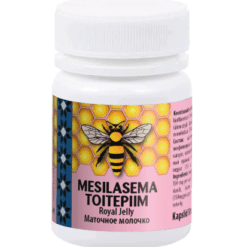A NATURAL WAY TO INCREASE THE AMOUNT OF MILK
Bee milk is one of the most valuable bee products.
It is also known as Royal Jelly, or the mother bee's nutritional milk.
Traditional Chinese medicine has been using bee milk for thousands of years to stimulate milk production, increase oestrogen levels and support the reproductive system.
Bee milk contains the same valuable substances as breast milk - proteins, fats, carbohydrates, vitamins (A, C, B1, B2, B3, B5, B6, B12, E, K, folic acid), macro- and microelements (calcium, iron, phosphorus, zinc, magnesium, sodium, potassium), digestive enzymes, hormones responsible for cell renewal and essential amino acids.
Royal Jelly is essentially a secretion from the glands of a carcass bee used to feed the larvae and adult queens, or queen bees.

Restore milk production naturally
Bee milk helps to restore milk production and has a number of biological properties, such as antibacterial, anti-inflammatory, hypotensive, oestrogen-like effects.

Breastfeeding is good for babies and mothers. Antibodies in breast milk help to protect the baby from disease. Breast milk gives your baby the perfect nutrition and supports growth and development. Breastfeeding can also help to protect the baby and the mother from certain diseases.
Benefits of bees' milk for YOUNG PEOPLE
- Promotes the production of breast milk
- Contains many useful substances - proteins, fats, carbohydrates, vitamins (A, C, B1, B2, B3, B5, B6, B12, E, K, folic acid), calcium, iron, phosphorus, zinc, magnesium, sodium, potassium.
- Protects the body against micronutrient depletion.
- It contributes to the rapid treatment of gynaecological problems.
PROVISION
Adults should not use more than 0.3 grams (300 mg). In two-week courses four times a year.
It should be taken 15 minutes before a meal, under the tongue, not swallowed, allowed to dissolve on its own and not drunk with water.
Bee milk and products containing it should not be used if you have:
- Substance intolerance, allergies
- Adrenal diseases
- Oncological diseases, tumours
- Diabetes mellitus
- Hypertension
- Increased blood clotting






